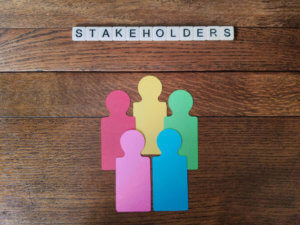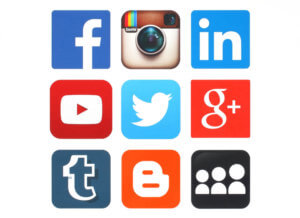Communicating your personal brand is most effective when you’re conscious and deliberate about your messaging and consistent in your words and actions. People are able to buy into your brand when they feel they can trust you.
My blog last week – 5 steps to developing your personal brand – had such a positive response with many people asking how to communicate your brand, how do you protect your brand, how do you make sure you’re the real deal and not just a façade you’ve created. All great questions, which I’m going to cover in detail over the next couple of weeks so watch this space!
In this age of the brand, we make powerful decisions based on what we associate with a brand, how we feel about it and what we believe it stands for. The same power applies to your personal brand. You cannot leave your brand to chance.
When communicating your personal brand here are 4 factors you need to consider…
#1 Think of your stakeholder groups
Your personal brand will be presented to different people at different levels and at different times, and how you communicate makes a huge difference in how it is going to be perceived and received.
Different audiences might include your boss, your customers, your friends, your family, your partner and your children. You may wish to demonstrate authenticity as a key brand characteristic, but the way you demonstrate authenticity through words and actions may be quite different.
To your boss, you may demonstrate yourself as an authentic team player, sharing your best ideas, being focused on details and seeing things all the way through to the end. To your children, you may never miss a ballet recital, a parents evening or a football match.
Imagine a lawyer who spends all day in court, locking horns with his opponents who then comes home in the evening and remains in that same mode with his partner and children. Clients and opponents may consider him to be focused and driven, but his partner and children think he’s the opposite: detached and disengaged. Those are two very different brand statements.
To be consistent, the lawyer will do much better if he can think in terms of applying his brand traits to the specific situation at hand. If he can learn to change modes in order to suit the current situation, all the time remaining true to his personal brand, whilst emphasising more relevant characteristics.
In all aspects of our lives, we too must do the same.
Map out your different stakeholder groups and become conscious and deliberate in how you and communicating your personal brand for each one.
#2 Don’t be the best-kept secret
Having had literally thousands of conversations over the years about the concept of personal brand, there is one critical point I urge you to consider;
You must communicate who you are as loudly as you can because there’s no point in being the best-kept secret in the marketplace.
It’s the definition of insanity to have talent, experience or expertise that you never properly leverage or that others never have the opportunity to truly benefit from.
Please do not become the best-kept secret in the market-place. You would be doing yourself a huge disservice. You may not be a natural self-promoter but other, lesser people are good at it, so through you need to find the place where you are comfortably uncomfortable doing it. (Check out 7 reasons why stepping out of your comfort zone is a must)
I am sure you’ve met individuals who always seem to get their voices heard, irrespective of the quality of the point or message they want to make. Some people always seem to be promoted at break-neck speed despite others asking questions about their capability or ‘fit’ for the role. I have met hundreds of people like this and here’s what I tend to find. These people never hang around for long! If you go back through their career, you see a pattern of both job and company movement on a frequent basis.
On the one hand, you could argue that they’ve done a brilliant job of communicating their personal brand. But if there isn’t the breadth and depth of substance to be able to back it up, then one of two things happen.
First, the individual jumps before they are pushed. And they will always have a compelling reason for doing so: they will say that the opportunity was not right for them (which usually has nothing to do with them). Second, they are pushed because they get found out. In essence, they might think they are doing a great job but it’s all smoke and mirrors.
The key message is simply this: whatever shop window you create for the outside world, make sure you have the breadth and depth of substance to back it up.
One way of doing this is by ensuring that there is only one version of the truth.
#3 Tell only one version of the truth
In today’s connected world, there is no such thing as ‘off stage’. We are always ‘on stage’ and every interaction you have will either enhance or devalue your personal brand. Whether it’s recruiters or customers, they will search across all your brand tools (CV, social media accounts, word of mouth) to sense-check consistency in how you are positioning yourself, personally and professionally.
Consistency is key.
This is where I recommend a clean sweep.
Scrub down your social media platforms and perform a cursory search on your friends’ platforms and remove any linked photos, videos or comments that don’t align with your personal brand. Update your online business profiles, your CV, your professional bio. Start as you mean to go on.
You may want to consider replacing the email address you’ve had since your college days with something more in keeping with your current and future brand. boozy- billy@gmail.com was fun while it lasted, but it’s time to move on. You’re not only communicating your personal brand to the world but to yourself, every minute of every day.
Ever heard of the word ‘verisimilitude’?
It means having the appearance of truth.
And in your personal brand, you want the appearance of truth across all your brand assets, tools and in the physical you – what you say, how you say it and your body language.
#4 Be a great storyteller
We live in a storm of stories. We live in stories all day and dream in stories all night long. We communicate through stories and we learn from them. We collapse gratefully into stories after a long day at work.
Without personal life stories to organise our experience, our own lives would lack coherence and meaning.
Brands play in an intensely competitive attention economy. The problem isn’t just that attention is a woefully scarce resource relative to demand, it’s that it’s also shattered and scattered around. We can’t blame our smartphones or other modern technologies for our short attention spans. The human mind is a wanderer by nature.
The most fundamental challenge we face in the attention economy is: how do we pin down the wandering mind?
The answer is by telling great stories.
In order to stand out and capture those wandering minds in the way a great movie or TV show might do, create great stories to explain who you are, what you do, what you believe and, most importantly, why. You can offer a list of characteristics, but a compelling story is always more memorable, and people who really stand out are those who are able to tell a compelling story simply and with passion, believability, and authenticity.
Your personal brand is what people say about you when you’re not in the room. What do you want people to be saying about you from this point on, and equally important what are you doing to influence it?
Supporting Resources on personal brand
5 steps to developing your personal brand







